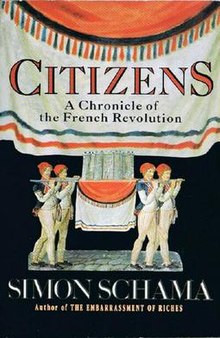Citizens: A Chronicle of the French Revolution
 |
|
| Author | Simon Schama |
|---|---|
| Country | United States |
| Language | English |
| Subject | The French Revolution |
| Publisher | Random House |
|
Publication date
|
1989 |
| Media type | Print (Hardcover) |
| ISBN | |
| OCLC | 20454968 |
| 944.04 20 | |
| LC Class | DC148 .S43 1990 |
Citizens: A Chronicle of the French Revolution is a book by the historian Simon Schama. It was published in 1989, the bicentenary of the French Revolution, and like many other works in that year, was highly critical of its legacy. "The terror," declared Schama in the book, "was merely 1789 with a higher body count; violence ... was not just an unfortunate side effect ... it was the Revolution's source of collective energy. It was what made the Revolution revolutionary." In short, “From the very beginning [...] violence was the motor of revolution.” Schama considers that the French Revolutionary Wars were the logical corollary of the universalistic language of the Declaration of the Rights of Man, and of the universalistic principles of the Revolution which led to inevitable conflict with old-regime Europe.
Marxist historian Eric Hobsbawm has described the book as being "exceptionally stylish and eloquent" and "extremely well-read." Nevertheless, he considers Citizens to be, above all, a political denunciation of the revolution and a continuation of a tradition in British literature and popular consciousness (established by the writings of Edmund Burke and Thomas Carlyle, reinforced by Dickens' A Tale of Two Cities and promulgated in subsequent pop literature), which has defined the Revolution foremost by the Terror. In Hobsbawm's view, Schama fails to see the positive aspects of the revolution and focuses solely on the horror and suffering, presenting them as gratuitous. Hobsbawm further criticizes the book, opining that "Schama is not involved as an expert in the field, for . . . the book does not set out to add to the knowledge already available. The author's choice of a narrative focused on particular people and incidents neatly sidesteps the problems of perspectives and generalization."
...
Wikipedia
